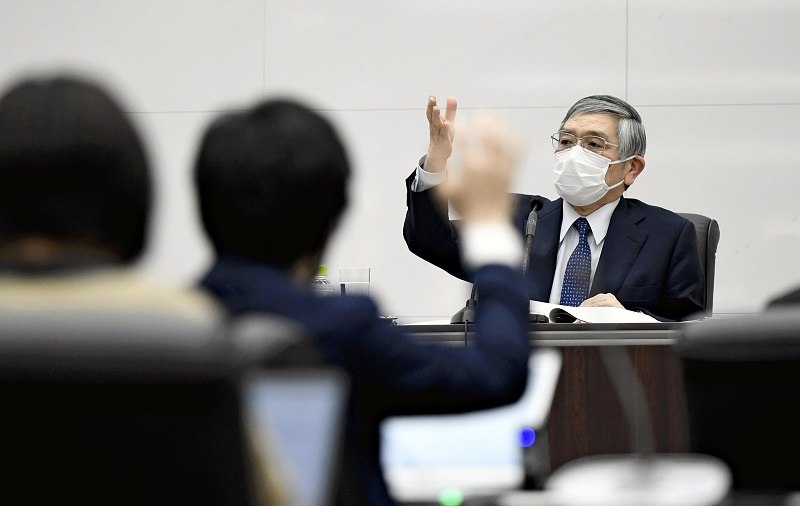BOJ makes minor changes to monetary easing policy but negative interest rates complicate measures

Bank of Japan Gov. Haruhiko Kuroda speaks at a press conference in Chuo Ward, Tokyo, on Friday.
16:14 JST, March 20, 2021
The Bank of Japan has made minor revisions to its monetary policy in a bid to increase the sustainability of the current easing measures, which will inevitably be prolonged.
As for the negative interest rate policy, which has had side effects, the central bank insists that it has been effective. However, the increasing complexity of the policy has made it difficult to understand.
At a press conference on Friday, BOJ Gov. Haruhiko Kuroda stressed the significance of the negative rate policy launched in February 2016. “It does not mean that the monetary easing we have been doing so far has been wrong because it has become clear that the policy has raised the inflation rate considerably,” Kuroda said
He also said that the revised measures would “increase sustainability and agility.”
The BOJ has maintained the negative rate policy because ending it could be perceived as a scaling-down of its monetary easing and could lead to a stronger yen in foreign exchange markets. A major revision could be perceived as an admission of a BOJ mistake.
Painstaking steps
The central bank’s insistence on negative interest rates has complicated its monetary policy.
The BOJ has now made it clear that the range of 10-year Japanese government bond yield fluctuations would be “between around plus and minus 0.25%.” It widened the range of fluctuations in consideration for factors such as the worsening profitability of financial institutions.
However, if interest rates rise in the future, there is a risk that the change could be seen as monetary tightening. In light of this, the BOJ will introduce “fixed-rate purchase operations for consecutive days” as a new tool to curb interest rates.
“It’s a maneuver to emphasize its monetary easing stance. The real intention is to raise interest rates to a certain level,” an analyst said.
The Bank of Japan has also taken painstaking steps to make its purchases of exchange-traded funds (ETFs) more flexible, abolishing a target of buying ETFs at an annual pace of ¥6 trillion in principle.
The BOJ’s ETF holdings have exceeded ¥35 trillion in book value. The figure is about 7% of the Tokyo Stock Exchange’s total market capitalization value, according to Kuroda.
The BOJ has become the de facto “major shareholder” of many companies. The abolition of the ¥6 trillion purchase target appears to be a response to criticism that ETF purchases by the central bank, which does not exercise voting rights directly, distorts corporate governance.
The BOJ now intends to only purchase ETFs tracking the Tokyo Stock Price Index (TOPIX), which has a large number of component stocks, to avoid leaning toward individual stocks.
The BOJ did not remove the annual ceiling of ¥12 trillion for ETF purchases. This is intended to prevent markets from perceiving the abolition of the ¥6 trillion target as the bank’s reluctance to buy ETFs. However, the move has made it difficult for market players to figure out whether the BOJ wants to reduce or expand its purchases.
Bullish stance
The introduction of a new interest scheme to promote lending has complicated the BOJ policy further. Under the scheme, the BOJ will pay a certain amount of interest to financial institutions to prevent their profits from deteriorating when interest rates are lowered through additional monetary easing. This is a measure to prepare for further easing.
However, it is widely believed that the BOJ will find it difficult to deepen negative rates in reality. “It would be better to review the negative rate policy itself in the first place,” an analyst said.
The BOJ intends to carry out the revised measures tenaciously to achieve its 2% inflation target, but the standstill in its monetary policy has become conspicuous.
Top Articles in Business
-

Prudential Life Insurance Plans to Fully Compensate for Damages Caused by Fraudulent Actions Without Waiting for Third-Party Committee Review
-

Narita Airport, Startup in Japan Demonstrate Machine to Compress Clothes for Tourists to Prevent People from Abandoning Suitcases
-

Japan, U.S. Name 3 Inaugural Investment Projects; Reached Agreement After Considerable Difficulty
-

JR Tokai, Shizuoka Pref. Agree on Water Resources for Maglev Train Construction
-

Toyota Motor Group Firm to Sell Clean Energy Greenhouses for Strawberries
JN ACCESS RANKING
-

Japan PM Takaichi’s Cabinet Resigns en Masse
-

Japan Institute to Use Domestic Commercial Optical Lattice Clock to Set Japan Standard Time
-

Israeli Ambassador to Japan Speaks about Japan’s Role in the Reconstruction of Gaza
-

Man Infected with Measles Reportedly Dined at Restaurant in Tokyo Station
-

Videos Plagiarized, Reposted with False Subtitles Claiming ‘Ryukyu Belongs to China’; Anti-China False Information Also Posted in Japan




















